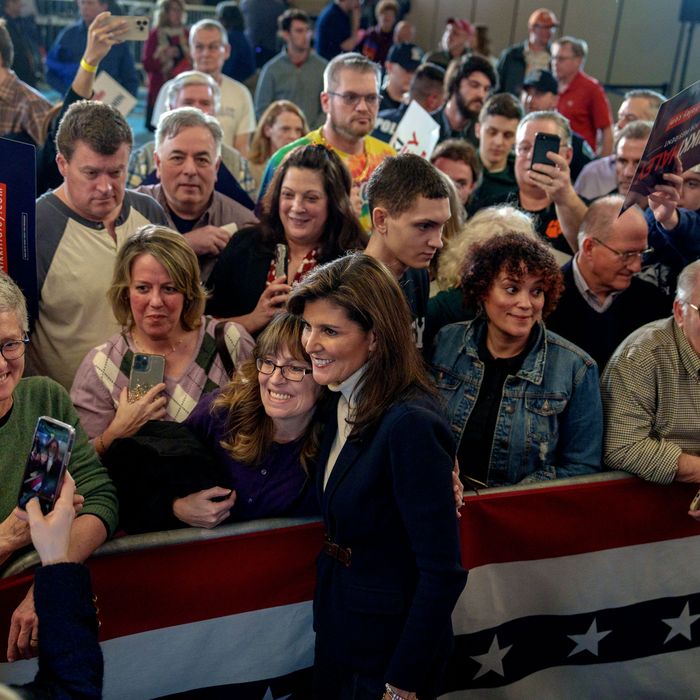
To hear the remaining Republicans supporting Nikki Haley for president tell it, they are the Goldwater brigades of 1964; they are the foot soldiers of the Reagan revolution in 1976, when he took his battle against Gerald Ford all the way to the convention. They see themselves, in other words, as no longer just a campaign but a cause.
They are not winning primaries (except in D.C.) and do not expect to, but they are after something more — the soul of the Republican Party possessed by Donald Trump. Their mentality goes a great deal toward answering one of the biggest questions in American politics right now: Why is Haley still running when she keeps losing to Trump by double digits without any hope of wresting the nomination from him?
“We have been continually told by GOP leadership that we can’t lose the Trump voter, we can’t insult Donald Trump, and we can’t win without Donald Trump. Well, a funny thing happened: In trying to appease and massage the Trump voter, you have offended the Reagan voter,” said Eric Levine, a top donor to the Haley campaign. “The party was so concerned about Donald Trump voters, but Nikki Haley still running and still getting 30 to 40 percent of the primary vote is our way of saying, ‘Hey, don’t forget about us, either.’”
That Haley is still running after losing the first three contests has surprised many people who have watched her as a shrewd political climber calculating every move of her political career. Haley, after all, is someone who in 2016 vowed, referring to Trump, “I will not stop until we fight a man that chooses not to disavow the KKK.” That was before she worked in his administration, then became one of its rare senior figures to leave on good terms, then broke with Trump after January 6, then said she wouldn’t run against him, and then did run against him but declined to fight him head-on until the rest of the competition was eliminated.
Her run has been remarkable. After starting out the campaign polling within the margin of error of zero percent, she used energetic debate performances to vault ahead of the competition, which gradually flamed out. Haley seemed to have figured out something Ron DeSantis and Chris Christie in particular could not: how to implicitly attack Trump without attracting the full force of his ire, at least until recently.
The loss in her home state of South Carolina would have been the kind of thing this Nikki Haley would have wanted to avoid since such defeats have long been thought to sink political ambitions. Yet Haley is still going, sloughing off the 20-point defeat there, a 40-point shellacking in Michigan just a few days later, and heading into Super Tuesday as polls show her losing in all 15 states that will vote.
“Everyone is aware that the math is the math here,” said Jayme Stevenson, the former Republican mayor of Darien, Connecticut, who said that despite voting for Trump in both 2016 and 2020 she would not in 2024. “We are talking about a Republican primary that brings out the most conservative voters in the process, and still Donald Trump isn’t getting much beyond 60 percent. It is highly likely that Donald Trump is going to eventually reach the delegate threshold, but he is nowhere near that at this moment and Nikki has every right to stay in the race and give people a choice.”
Because Haley has been so shrewd in plotting her political rise — her detractors would say calculating and unscrupulous — it has been assumed among the political cognoscenti that she is making some sort of play here, perhaps trying to set herself up to be picked as Trump’s running mate or laying the groundwork for a run on the No Labels ticket. She has publicly ruled out both, and people on and close to the Haley campaign say either option is implausible at this point. On the VP question, there is too much bad blood between her and Trump, for one thing, and the MAGA faithful would consider it a betrayal. As for No Labels, people close to her say she is very aware that third parties have an almost impossible chance of winning the White House.
“I keep getting this bullshit, and I don’t understand it,” said Katon Dawson, a top Haley adviser. “She is going to run the clock out because she can. Our donors keep giving money, and our voters keep saying they want a choice and they want to hold Donald Trump accountable. If we are going to run our people out of the Republican Party, then we don’t stand a chance anywhere.”
After winning the New Hampshire primary — in which Haley was expected to potentially upset him — Trump, using his favorite put-down for her, wrote on Truth Social, “Anybody that makes a ‘Contribution’ to Birdbrain, from this moment forth, will be permanently barred from the MAGA camp. We don’t want them, and will not accept them, because we Put America First, and ALWAYS WILL!” Now many Haley donors say they see no need to stop funding her campaign since they are barred from Trump world already anyway.
“If Donald Trump is really going to be the nominee, this is the time for him to ask people for their vote, but here I am banned from MAGA world,” said Levine, the Haley donor. “Not only is he not trying to win us back, but I see that he is considering Tulsi Gabbard as his VP, the same Tulsi Gabbard who was vice-chair of the DNC and only left to join the Bernie Sanders campaign. I am shocked that someone who thought socialism and ‘blame America first’ would ever be on a Republican ticket but I guess if you say ‘Donald Trump, I love you’ and you buy a couple of his sneakers, you too can be considered for vice-president.”
For many members of what used to be the Republican Establishment, these are dark times. Mitch McConnell, the wily lion of the Senate, is leaving, drummed out in part by his support for Ukraine. Kevin McCarthy was defenestrated by Matt Gaetz. Stalwart conservatives who led the party just a couple of years ago, such as Mitt Romney and Liz Cheney, have said they cannot support the Republican ticket if Trump is on it. A new generation of conservatives in the House who were thought to one day be party leaders — Will Hurd, Mike Gallagher, and Patrick McHenry — have all announced they can’t take it anymore and are leaving politics. Haley is, for this crowd, their last hope.
“Nikki is consistently getting 30 to 40 percent of the vote, which can’t be ignored,” said Olivia Perez-Cubas, a spokesperson for the Haley campaign. “She’s fighting for the future of the Republican Party and long-standing conservative principles like fiscal discipline and a strong national security. If we don’t right the ship, Republicans are going to keep losing, and that means Democrats and the far left will keep winning.”
Haley’s politics of fiscal conservatism, a strong national defense, and a high regard for the institutions of government would seem to be a poor fit for a populist nationalist party. Even if Trump were not to make it to the Republican convention owing to his legal travails or a health issue, it is difficult to see how the GOP delegates who are currently committed to him would pick Haley.
Yet the 40 percent of the vote she won in New Hampshire and South Carolina is not much off the results of other insurgents who threw a scare into candidates who had been considered invulnerable. The figure is close to the 43 percent Bernie Sanders won when he battled Hillary Clinton in 2016, and it is not much off the 41 percent Eugene McCarthy won in New Hampshire in 1968 that drove Lyndon Johnson out of the race. It’s better than the 37 percent Pat Buchanan got in New Hampshire in 1992 against George H.W. Bush, and roughly in line with what Rick Santorum was pulling against Mitt Romney in 2012 when he battled for the nomination into April.
“Forty percent of the country is hungry for normal, and that is a number that is going to grow over time, especially if Trump loses in November and especially if we lose the House of Representatives or we end up with a very narrow majority in the Senate,” said Ozzie Palomo, a lobbyist and Republican fundraiser supporting Haley. “If all of those things play out, that is where someone like Nikki Haley can say ‘I told you this might happen,’ and there is another path forward here.”
The hope among the Haley crowd is that, should Trump lose in November, the party will start to look for answers and the slow purge of the MAGA element will begin. People close to Haley say that by making the case now, she is laying the groundwork for the possibility of a new Republican Party, if not in 2028, then a few cycles down the line.
“By continuing to stay in the fight, she is driving the conversation,” said Rob Godfrey, a former close Haley aide who is neutral in the 2024 primary. “It’s setting the table for the kind of conversation we are going to be having a year from now, four years from now, eight years from now. It is part of changing the direction of the country, and that is separate from any political conversation about what her future looks like.”
In the chaos of our political moment, Godfrey added, it is unlikely that the decision to drag out the campaign will have much impact on Haley’s future: “How long anyone decides to stay in this nominating contest will long be forgotten by the time the next campaign begins.”
Not every Republican, or even every Haley supporter, agrees. Andy Sabin, a metals magnate and early Haley donor, said it is long past time for her to drop out.
“She is making a fool of herself,” he said. “I don’t know, maybe she is one of these people that likes getting the shit beat out of her, but I told her she should save her money in case Trump implodes. What are you going to accomplish by showing you can lose by 40 points?”






























